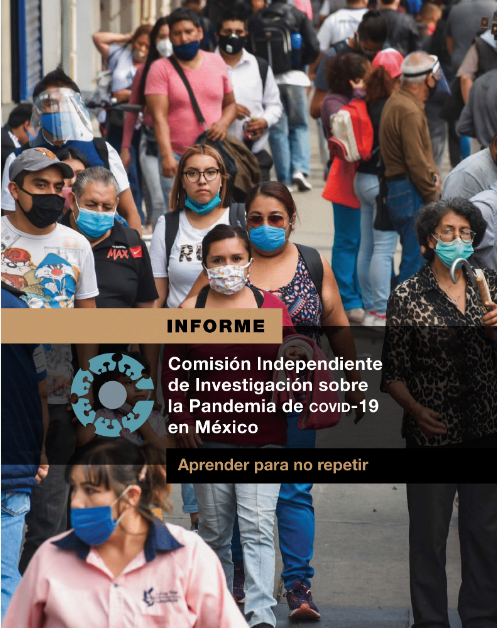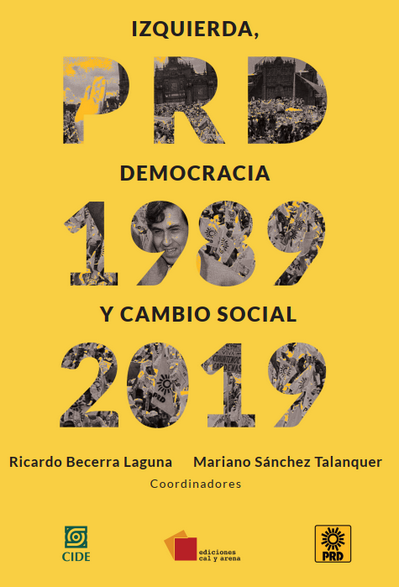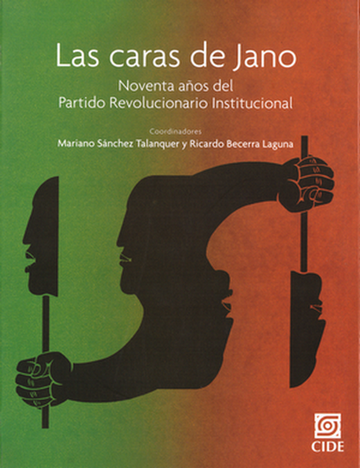About
Welcome!
I am an Assistant Professor in the Center for International Studies at El Colegio de México (Colmex). Since January 2023, I have served as the Editor-in-Chief of the academic journal Foro Internacional. I earned a Ph.D. in Government from Cornell University. Prior to joining the faculty at Colmex, I held positions as an Academy Scholar at the Harvard Academy for International and Area Studies and as an Assistant Professor of Politics at the Centro de Investigación y Docencia Económicas (CIDE) in Mexico City. In 2023-2024, I served as Research Coordinator and Lead Author for Mexico's Independent Investigation Commission on COVID-19.
My research interests include state-building, democracy and autocratization, and historical institutional development, with a regional focus on Latin America. I have also conducted research on health politics and policy. My ongoing book project (Partisan Leviathan: Uneven State-Building in Colombia and Mexico) examines how partisan antagonism shapes state-building by producing uneven state development across territory and governance functions. The book builds on my doctoral dissertation, which received the 2018 William Anderson Award to the best dissertation in the general field of federalism or intergovernmental relations, state, and local politics, from the American Political Science Association (APSA).
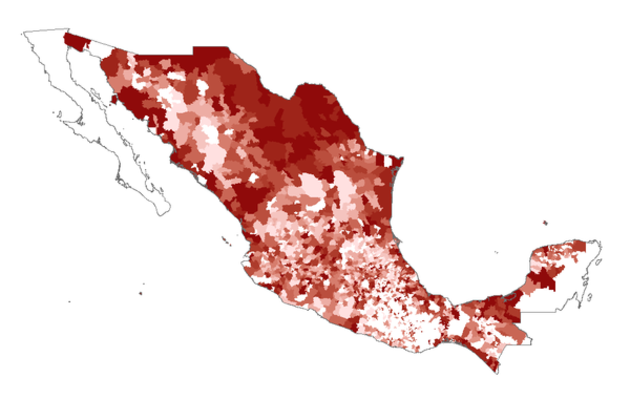
Per capita municipal tax revenues, 1945
Research
Articles
"Constitutional Renewals: The Lineage of Democratizing Constitutions." 2025. Public Choice (accepted). (With Gabriel Negretto) [Online Appendix] [Replication files]
"Constitutional Origins and Liberal Democracy: A Global Analysis, 1900-2015." 2021. American Political Science Review 115, n.2. (With Gabriel Negretto) [Online Appendix] [Replication files]
"Is Mexico Falling Into the Authoritarian Trap?" 2021. Journal of Democracy 32, n.4. (With Kenneth F. Greene)
"One-Eyed State: The Politics of Legibility and Property Taxation." 2020. Latin American Politics and Society 62, n.3. [Online Appendix]
"Building the Modern State in Developing Countries: Perceptions of Public Safety and (Un)willingness to pay Taxes in Mexico." 2020. Politics & Society 48, n.3. (With Gustavo Flores-Macías)
"Mexico 2019: Personalistic Politics and Neoliberalism from the Left." 2020. Revista de Ciencia Política 40, n.2.
- Partially reprinted and updated in Balance Temprano. Desde la Izquierda Democrática, eds.
Ricardo Becerra and José Woldenberg. Ciudad de México: Grano de Sal, 2020.
"Mexico's Party System Under Stress." 2018. Journal of Democracy 29, n.4 (October). (With Kenneth F. Greene)
Health systems and COVID-19
"Non-pharmaceutical interventions to combat COVID-19 in the Americas described through daily sub-national data." 2023. Scientific Data (Nature) 10, 734. (With the University of Miami Observatory to Contain COVID-19 in the Americas)
"Strengthening Health Systems To Face Pandemics: Subnational Policy Responses To COVID-19 In Latin America." 2022. Health Affairs 41, n.3. (With the University of Miami Observatory to Contain COVID-19 in the Americas)
"Mexico's Response to COVID-19: A Case Study." 2021. Institute for Global Health Sciences, UCSF. Prepared for
the World Health Organization’s Independent Panel for Pandemic Preparedness and Response.
(Lead Author. With Jaime Sepúlveda, Eduardo González-Pier, Lucía Abascal-Miguel,
Jane Fieldhouse, Carlos del Río, and Sarah Gallalee).
(Versión en español).
"Punt Politics as Failure of Health System Stewardship: Evidence from the COVID-19 Pandemic Response in Brazil and Mexico." 2021. The Lancet Regional Health-Americas 4. (With Felicia Knaul, Michael Touchton, et. al.)
"A Partisan Pandemic: State Government Public Health Policies to Combat Covid-19 in Brazil." 2021. BMJ Global Health 6(6). (With the University of Miami Observatory to Contain COVID-19 in the Americas)
"Not Far Enough: Public Health Policies to Combat COVID-19 in Mexico’s States." 2021. PLOS One 16(6). (With the University of Miami Observatory to Contain COVID-19 in the Americas)
Edited books
Informe de la Comisión Independiente de Investigación sobre la Pandemia de COVID-19 en México. Aprender para no repetir. Head author and research coordinator. 2024. (Edited with Jaime Sepúlveda)
Izquierda, Democracia y Cambio Social. PRD: 1989-2019. Edited volume. 2020. Ciudad de México: Cal y Arena. (Edited with Ricardo Becerra)
Las caras de Jano: 90 años del PRI. Edited volume. 2019. Ciudad de México: CIDE. (Edited with Ricardo Becerra)
"¿La venganza del ‘pueblo’? La democracia frente a sí misma." Editor, special issue, Configuraciones 48-49 (January-August 2019). Essays by Lührmann and Lindberg, Urbinati, Roberts, Riofrancos, Schedler, González and Saffon, Becerra, Pantoja, Oñate.
Book chapters
"La geografía de la pandemia en México: desigualdad social y fragmentación sanitaria." 2025. In Martha Schteingart and Dairee Ramírez (ed.), Desigualdades territoriales en el contexto de la pandemia por COVID-19. Ciudad de México: El Colegio de México.
El Ejército paralelo: las defensas rurales y el orden político en México, 1920-2020." 2024. In Ariel Rodríguez Kuri (ed.), Violencias mexicanas, 1920-2020. Once estudios. Ciudad de México: El Colegio de México.
"¿El Estado contra los estados? Capacidades subnacionales en el sistema federal." 2024. In Enrique Cabrero, Guillermo M. Cejudo and Sergio López Ayllón (coords.), Los nuevos escenarios para el federalismo mexicano. Desafíos y tendencias futuras. Guadalajara: Universidad de Guadalajara. (with Abel Vidaña)
"La recesión democrática como un problema de estatalidad." 2021. In Rolando Cordera and Enrique Provencio, eds. Informe del desarrollo en México. Ciudad de México: UNAM, Programa Universitario de Estudios del Desarrollo.
"1989-2019. La política en una época de desgarramiento social." 2020. In Izquierda, democracia y cambio social: PRD, 1989-2019, eds. Ricardo Becerra and Mariano Sánchez-Talanquer. Ciudad de México: Cal y Arena.
"The Political Economy of NAFTA/USMCA." 2019. In Oxford Research Encyclopedia of Politics. Oxford University Press. (With Gustavo Flores-Macías)
“Las huellas del pasado. Legados representativos de la era del PRI.” In Las caras de Jano: 90 años del PRI, eds. Mariano Sánchez-Talanquer and Ricardo Becerra. Ciudad de México: CIDE. In press.
"Authoritarian Legacies and Party System Stability in Mexico." 2018. In Scott Mainwaring (ed.) Party Systems in Latin America: Institutionalization, Decay, and Collapse. New York: Cambridge University Press. (With Kenneth F. Greene) [Online Appendix]
"Voto y ciclo económico" and "Clientelismo y coacción." 2017. In Informe sobre la democracia mexicana en una época de expectativas rotas. Mexico City: Siglo XXI Editores.
"La economía política del salario mínimo: Estados Unidos y América Latina en perspectiva comparada." 2016. In Del salario mínimo al salario digno. Distrito Federal: CESCDMX-Cal y Arena.
"El cambio constitucional necesario." 2012. In Equidad social y parlamentarismo. Edited by Ricardo Becerra. Distrito Federal: Siglo XXI Editores.
Work under review and in progress
"Suffrage Restrictions and the Reach of the Nation-State." 2019 award for best paper presented in the Annual Meeting of the American Political Science Association (APSA), Comparative Democratization Section.
"Perverse Autonomy: Bureaucratic Insiders and Strategic Adaptation to Meritocratic Reforms." (With Julio Ríos-Figueroa)
"Crime, Social Distance, and Elite Support for Redistribution in Unequal Societies." (With Gustavo Flores-Macías and Vincent Mauro)
"Spatial Inequality, (In)security, and Support for the Tax State: Evidence from Mexico." (With Gustavo Flores-Macías)
"'Indians' into Mexicans: Land Reform and Linguistic Assimilation in Revolutionary Mexico."
"Social Dissent, Coercive Capacity, and Redistribution: Evidence from Authoritarian Mexico." (With Horacio Larreguy and Juan Felipe Riaño)
"Legacies of Revolution: Popular Militias and the Rule of Law."
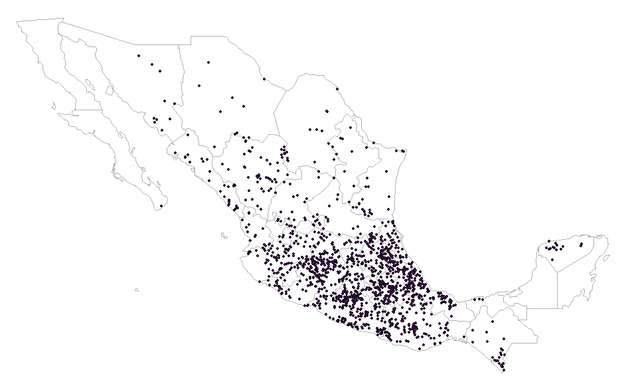
Rural defense militias in postrevolutionary Mexico
Book manuscript
Partisan Leviathan: Uneven State-building in Colombia and Mexico
Why do states develop stronger authority in some parts of their territory and governance functions than in others? Classic accounts of state-building overlook two critical elements: subnational variation in state capacity and the crucial role of partisan politics in shaping the state’s territorial and societal reach. This book brings partisanship directly into the study of state-building, conceived as a multi-dimensional and spatially uneven process. It argues that when parties emerge and consolidate before states, partisan antagonisms become embedded in state-building processes, producing stark and lasting differences in state capacity across both regions and governance domains. These conflicts leave behind legacies of “dual unevenness”—variation in state capacity across both territory and governance functions—that persist long after the original partisan clashes have subsided.
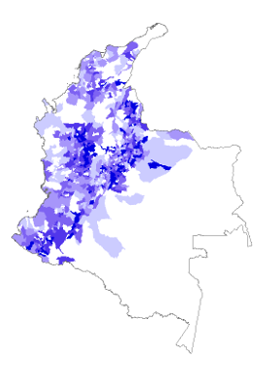
Conservative Party vote share, average 1930 and 1946
The book develops a theoretical framework on how partisanship shapes both the territorial reach and functional scope of state capacity. Confronting a partisan-political geography beyond their immediate control, state-building elites strategically invest in institutional capacities across the territory to secure dominance. Their initiatives encounter outpartisan resistance, creating a recursive process that shapes patterns of institutional development. These formative periods determine how and where state institutions take root, with the degree of partisan alignment across territory influencing the state’s capacity to perform core functions like taxation, coercion, education, registration, and agrarian reform. Moreover, these political divides generate enduring institutional legacies.
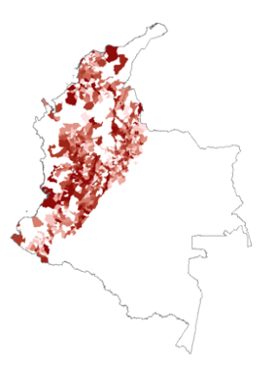
Per capita tax revenue, 1950
Drawing on extensive archival research and original historical datasets, I analyze the uneven development of key state functions in twentieth-century Mexico and Colombia. In Mexico, conflict between the revolutionary party-state and counterrevolutionary forces produced lasting regional disparities in fiscal capacity, security provision, agrarian reform, and basic education. In Colombia, entrenched partisan competition and periods of monopolistic control by either Liberals or Conservatives led to similarly uneven outcomes in tax collection, literacy, and property registration. Both cases exhibit a pattern of “dual unevenness”—variation across both territory and state functions—that the book explains through its focus on partisan state-building.
This analysis provides fresh insights into state-building, the political origins of state capacity, and the long-term legacies of partisan cleavages. Partisan Leviathan reveals how historical political antagonisms shape the geography of state power and why these inequalities may persist over time.
Essays & Commentary
"El federalismo sometido." Diciembre 2024. Nexos, Pacto Federal.
"El valor de la democracia." Octubre 2024. Configuraciones 54-55.
"La izquierda oficialista." Julio 2024. Otros Diálogos 28.
"El ‘Plan B’ o el caballo de Troya." 2023. Ciudad de México: UNAM-IIJ.
"Los derroteros del populismo contemporáneo. Entrevista con Nadia Urbinati." Agosto 2023. Nexos 46, n.548. (Con Roberto Breña)
"La contrarreforma definitiva: prejuicios y peligros de la reforma electoral." Noviembre 2022. Letras Libres.
"Qué significa la defensa del CIDE." December 2021. Letras Libres.
"Orden y desorden político de México." February 2021. Nexos n. 518.
" Las Defensas Rurales del Ejército y las raíces históricas de la militarización." October 2020. Programa para el Estudio de la Violencia, CIDE.
"Errada y errática: la respuesta gubernamental a la pandemia." August 2020. Nexos (With Felicia Knaul, Julio Frenk, Salomón Chertorivski, and Héctor Arreola-Ornelas)
"La letalidad hospitalaria por COVID-19 en México: desigualdades institucionales." August 2020. Nexos, Taller de Datos.
" Mexico’s Economic Austerity is a Danger. Including for the U.S." June 2020. (With Kenneth F. Greene)
"Crisis y pensamiento después del fin de la historia." Configuraciones 50 (sept 2019-mar 2020).
"La desfiguración de la representación política: populismo y bonapartismo en el siglo XXI," in "¿La venganza del 'pueblo'? La democracia frente a sí misma," ed. Mariano Sánchez-Talanquer, special issue, Configuraciones 48-49 (Jan-Aug 2019): 10-30.
¿Democracia clientelar? La representación política frente a la debilidad estatal. July 2019. Ciudad de México: Friedrich Ebert Stiftung.
" Los derechos cuestan: debilidad fiscal y límites de la "Cuarta Transformación." January 2019. Primer Saque.
A Trade Deal Worse than NAFTA. October 1, 2018. The New York Times. (With Gustavo Flores-Macías)
NAFTA’s Overhaul: From Stability to Uncertainty. September 2018. Foreign Policy Research Institute. (With Gustavo Flores-Macías)
Review of Violence and Crime in Latin America: Representations and Politics, David Carey Jr. and Gema Santamaría (eds). 2018. Bulletin of Latin American Research 37, n.5 (November).
The Future of Mexico under AMLO. July 2018. Foreign Policy Research Institute.
Lo que está en juego en las elecciones de México. May 2018. Misión de Observación Electoral, Colombia.
El Panorama Electoral en América Latina en 2018. Foreign Affairs Latinoamérica 18, n.1. (With Gustavo Flores-Macías)
Teaching
Transformations of the Modern State (Spring 2024, Fall 2025). El Colegio de México. Advanced undergraduate course.
Comparative Political Regimes (Fall 2023). El Colegio de México. Graduate seminar.
Autocratization and Democratic Challenges (Fall 2022). El Colegio de México. Graduate course.
Quantitative Research Methods I (Fall 2021). El Colegio de México. Graduate.
Comparative Politics (Spring 2021). El Colegio de México. Undergraduate.
Political Institutions I: The State, Constitutionalism, and Democracy (Fall 2018, 2019, 2020). CIDE. Undergraduate.
Comparative Political Economy (Spring 2019). CIDE. Graduate seminar.
CV
